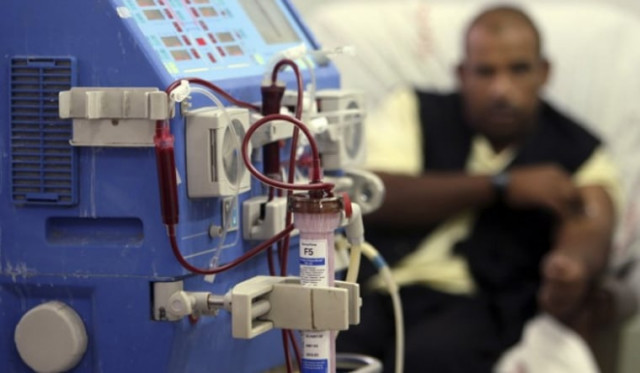Patients in Nowshera face gruelling journey for dialysis
Soon Valley residents say life-saving treatment 60km away is costing them their health, savings

Hundreds of kidney patients in Tehsil Nowshera are trapped in a worsening health crisis as the region continues to operate without a single dialysis centre.
With no local treatment available, patients must endure a gruelling 60-kilometre journey along rough, mountainous roads to Khushab multiple times a week, an exhausting and risky ordeal that has become their only lifeline.
Educationist Malik Usman Ghazi Awan told Express that the 60-kilometre stony and uneven route from Nowshera to Khushab is a severe test for any frail patient.
Kidney patients, already battling extreme weakness, breathlessness and fatigue, must undertake this dangerous journey two to three times a week. The one-way trip can take up to two hours.
"After dialysis, when their bodies are completely drained, the jolts of the return journey and long waiting times break them even further," he said.
Families of several patients say their loved ones' health deteriorates not inside the hospital, but during this punishing travel.
The crisis is not only physical but also financial. Small farmers and labourers spend thousands of rupees every other day on transport and fuel, an amount that often exceeds the cost of dialysis itself.
Many households in the valley have been financially ruined; jewellery and ancestral land have been sold just to keep up with the relentless 60-kilometre cycle of suffering.
Political and social figure Malik Saleem Awan said the "most shameful role" in this tragedy is that of elected representatives and the tehsil administration.
"The people who were supposed to be their voice never raised this issue on the assembly floor nor took serious steps to secure emergency funds," he said. "They show up only to ask for votes. When people need life-saving action, they treat the file like a worthless piece of paper."
He added that priority has repeatedly been given to personal interests and construction projects with higher "commission potential," exposing what he described as "acute incompetence and moral bankruptcy."
Saleem Awan said that although Nowshera's THQ Hospital already has the space and basic infrastructure for a dialysis unit, tehsil-level officers have shown "criminal negligence" by delaying the file every time with the excuse of "no funds," despite knowing that such delays could result in deaths on the road.
Social activist Malik Shehbaz Awan questioned the Punjab government's silence, terming it alarming.
"Despite tall claims of healthcare reforms, why is the provincial government ignoring the basic right to treatment for nearly 200,000 residents of Nowshera?" he questioned.
"The people demand that the Chief Minister and Provincial Health Minister take immediate notice and release emergency funds. Patients cannot endure another day of this deadly journey."
He said the people of Soon Valley are now pinning their hopes on one influential figure who belongs to the valley, Attorney General of Pakistan Malik Mansoor Usman Awan.
As a native of the region, he is well aware of the area's geographical and economic difficulties.
Locals are appealing to him to personally intervene and use his influence to persuade the Punjab government to establish a dialysis centre without delay.
"The people consider him their true representative," Shehbaz said. "One strong voice from him can end this collective suffering and ensure the immediate installation of dialysis machines at THQ Nowshera. This is the moment for him to repay his homeland."
When contacted, Khushab CEO Health Dr Saima Ikram said there is no official plan, approval, or documentation for the establishment, expansion, or operationalisation of a dialysis unit at Nowshera's THQ Hospital.




















COMMENTS
Comments are moderated and generally will be posted if they are on-topic and not abusive.
For more information, please see our Comments FAQ